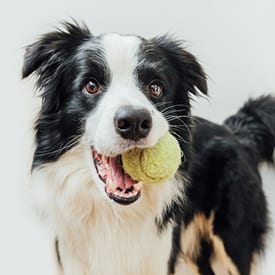Do you think your dog might have kennel cough? Or have you recently adopted a new dog and heard about kennel cough? If you’re looking for more information about this condition, you’ve come to the right place.
In the article below, we’ll explain some of the basics of kennel cough. With the help of this information, you can figure out whether you think your dog needs to see a veterinarian, and if so, what you might be able to expect from your vet visit. Read on to find out more!
 Cause
Cause
Kennel cough is caused by a type of bacteria called Bordetella. Although many cases of kennel cough can be attributed to Bordetella alone, some cases also involve viruses like distemper or influenza. Although all these conditions are very highly contagious between dogs, they cannot be transmitted from dogs to humans or vice-versa.
Kennel cough is transmitted between dogs through several methods. The first of these is contact. Dogs who are in physical contact with each other can easily spread kennel cough.
The second is airborne transmission, which occurs when dogs cough, sneeze, or bark. The droplets that leave one dog’s body may spread kennel cough to another dog. Finally, dogs may also transmit this disease through contaminated objects and surfaces, such as bedding, food dishes, collars, leashes, and toys.
Since dogs in close contact with each other are much more likely to spread this disease, it is often found in boarding facilities and kennels. This is where its common name of kennel cough comes from. However, this is a little bit of a misnomer, in that kennel cough can be spread anywhere dogs encounter each other, including in your own home or in a dog park.
Symptoms of Kennel Cough
This list includes some of the most common symptoms of kennel cough. Some dogs may have all of these, while some dogs may only have one or two.
- Honking cough that sounds like a goose. This is the most well-known and widely recognized symptom of kennel cough in dogs. If your dog is coughing often and sounds like a goose’s honk when he does, then he probably has kennel cough.
- Runny nose and runny eyes
- Sneezing and wheezing
- Lethargy and loss of interest in activities
- Loss of appetite
- Fever
- A dog may run a low fever with kennel cough. However, high fever is not usually indicative of this disease.
Treatments for Kennel Cough
Dogs who are young, healthy, and doing well overall otherwise probably don’t need any treatments for kennel cough. This condition usually clears up after a few weeks, especially if you can keep your dog well-rested during this time. Your dog may need additional fluids while recovering from a kennel cough infection, but this can be managed by simply giving him extra water to drink at home.
However, if your dog is older or is a very young puppy, or if your dog has other health conditions to be concerned about, your veterinarian may give you antibiotics or a nebulizer for your dog while he deals with his kennel cough. Some dogs may also receive cough medication, especially if their coughing is very severe or is causing them to vomit. However, if your vet doesn’t believe your dog needs any of these medications, it’s best to listen to the vet’s advice and refrain from giving them. Never give your dog human medication.
Outlook
Dogs almost always recover fully from kennel cough. However, they can catch it again if they are not vaccinated against it, so it’s important to talk to your vet about getting your dog the vaccines that can help him reduce the risk of kennel cough in the future.
Dog vaccinations related to kennel cough include canine parainfluenza, canine distemper, and Bordetella vaccines. The vet can give you more information about all these shots and let you know when it may be safe for your pet to receive them. By keeping up with these shots, you will prevent your dog from being able to contract kennel cough in the future.
Talk with Your Vet in Miami, FL
As you can see, kennel cough is not usual a fatal illness, but it is one you should be on the lookout for if you have a dog. It is very easy for dogs to catch kennel cough, and your pet may end up affected by this condition if you board him or take him to a dog daycare.
Most reputable dog daycares and boarding facilities will not allow a dog to stay on-site without proof of an up-to-date kennel cough vaccination. Keep this in mind as you choose whether you want to have your pet vaccinated against kennel cough. Call (305) 663-3300 or book an appointment online to talk with the Country Club Animal Hospital vets about kennel cough!
